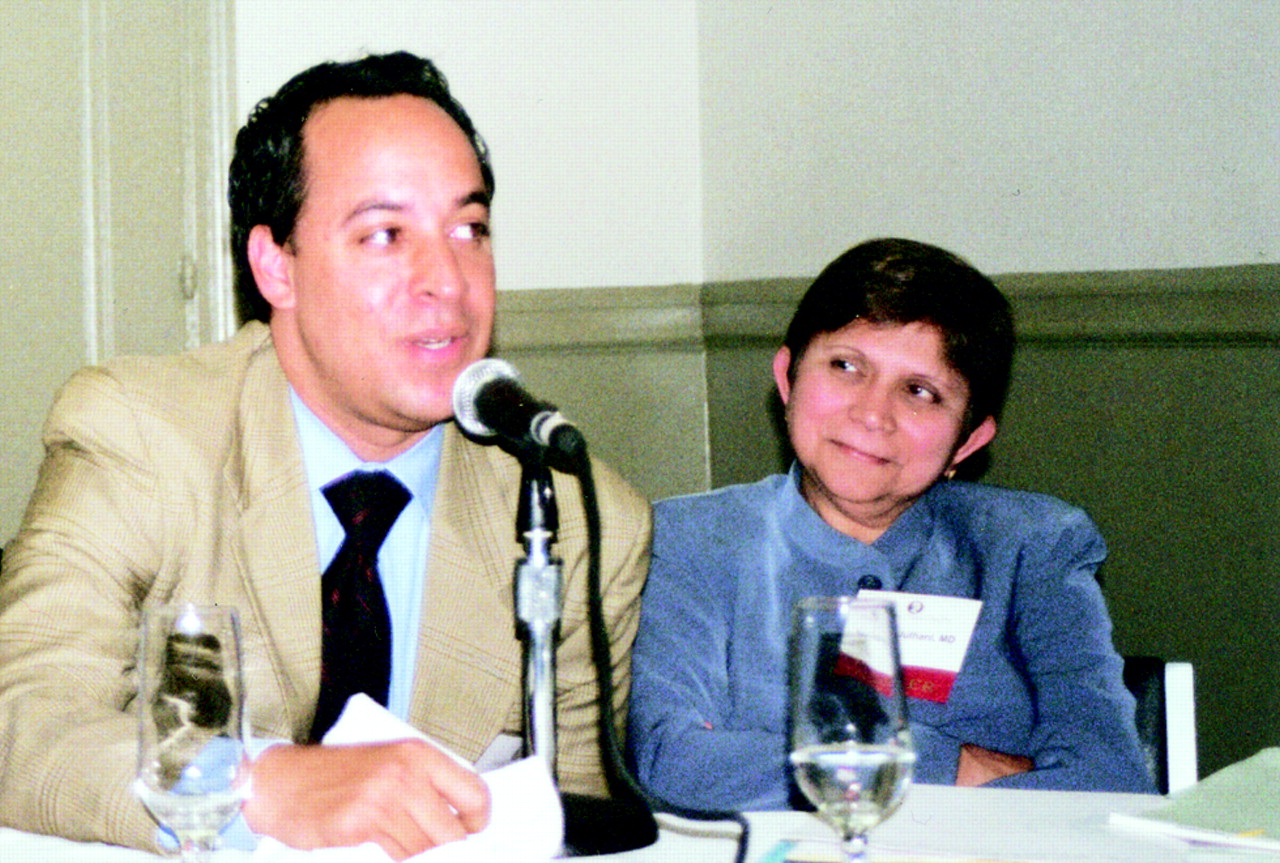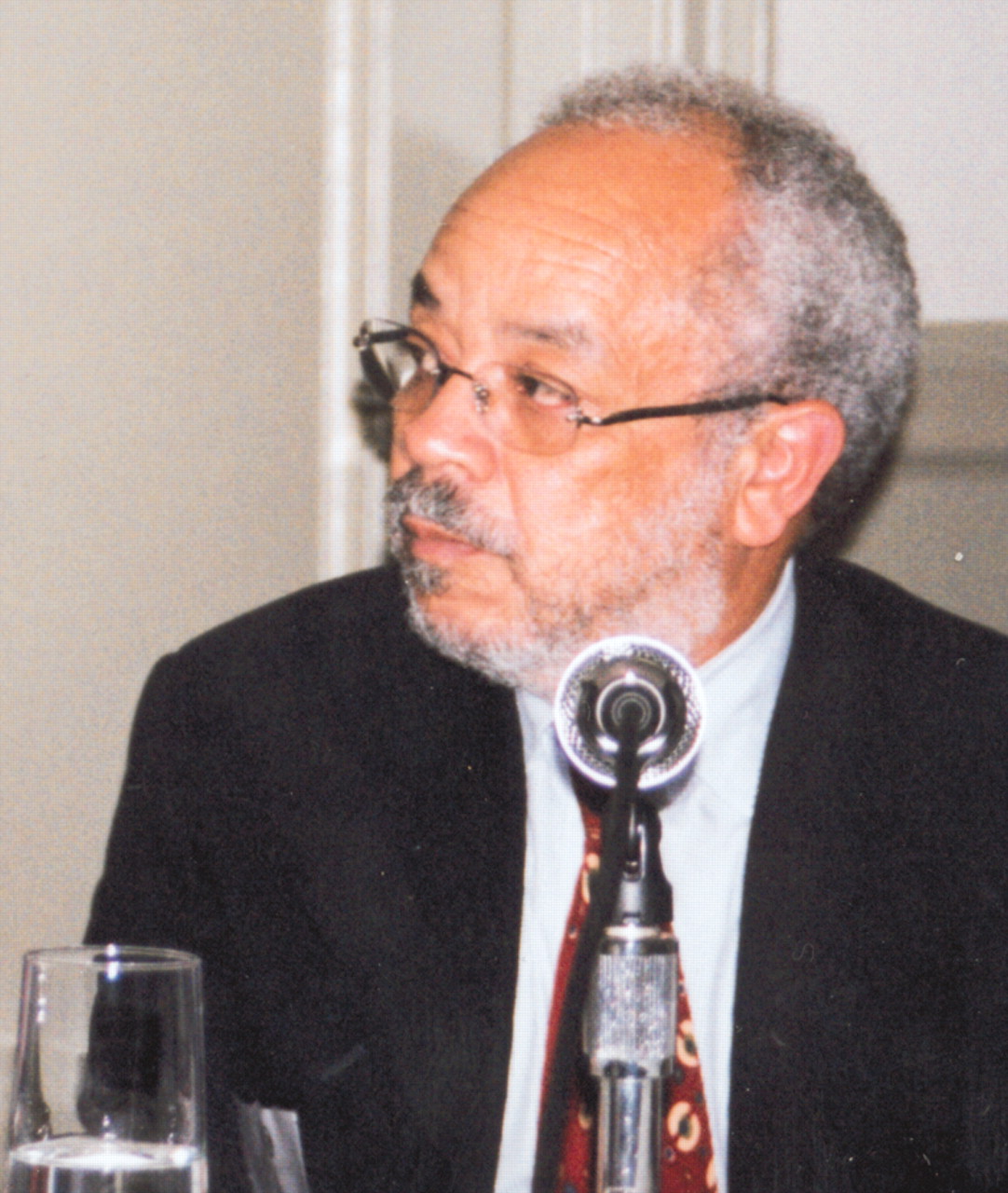Bias Toward Some Residents Can Impede Patient Care
Psychiatry residents who are from developing countries or belong to minority groups often experience unique stressors during training due to cultural and racial differences, said experts last month at the New York Academy of Medicine (NYAM) Section on Psychiatry 2004 Stuart Asch Memorial Lecture in Manhattan.
Nalini Juthani, M.D., was a psychiatry residency training director at Bronx-Lebanon Hospital Center for 25 years before joining the Residency Review Committee for Psychiatry in January 2002.

Michael Pratts, M.D., points out that stereotypical thinking about African Americans may affect how Caucasian physicians treat them. At right is Nalini Juthani, M.D.
Juthani, who also serves on the Psychiatric News Editorial Advisory Board, described some of her experiences as a newly arrived immigrant from India 34 years ago. “International medical graduates [IMGs] were told by hospital staff to go back to the country they came from. We reacted to these insults in different ways. Some IMGs simply ignored or tolerated them, while I used humor and information to educate people,” said Juthani.
The topic of the session was residents' mental health from a cross-cultural perspective.
Juthani said she emphasized to hospital staff that the United States was a land of immigrants and that IMGs were serving an important and much-needed role due to shortages of American physicians in the 1960s and 1970s.
Patients React to IMGs
The reactions from patients to IMGs ranged from identifying with them to making fun of their accent, she said. Not much has changed—an IMG resident recently told Juthani that a patient demanded she speak in English.“ She was speaking English, with an accent,” Juthani explained.
Psychiatry in most developing countries is undervalued and underutilized, Juthani said. “Psychiatry is not necessarily the IMGs' first choice.” After deciding to specialize in psychiatry, she waited a few years before telling her family in India of her decision. “My grandfather's response was, `I thought you went to America to become a better doctor,'” Juthani said.
“Teaching psychotherapy to IMGs from developing countries can be challenging, because the emphasis in their countries of origin is on how people adapt to their emotional states rather than on the emotions themselves,” Juthani explained.
In many developing countries, people show respect to persons in authority, including physicians, by not questioning them. A woman resident typically doesn't make eye contact when talking to an attending physician who is a man, Juthani observed. However, attending physicians in the United State have misinterpreted IMGs' behavior toward them, which can affect their performance evaluations, Juthani said.
To help IMGs navigate these cultural differences, Juthani recommended mentorships, culturally sensitive therapy groups, and seminars on cross-cultural psychiatry.
Racial Stereotyping Affects Care
Michael Pratts, M.D., a second-year fellow in child and adolescent psychiatry at the State University of New York–Downstate Medical Center, has seen people's attitude change when he tells them he is African American. Strangers often perceive him as non-black because of his light skin tone.

Ezra Griffiths, M.D.: “Many blacks have come to expect negative, abrasive, or caustic reactions or comments from whites.”
Stereotypes about blacks prevail, said Pratts, who cited the results of a recent poll by the National Opinion Research Center at the University of Chicago. Seventy-eight percent of Caucasians and other non-black people responded that blacks preferred to be on welfare rather than be self-sufficient, 68 percent thought blacks were lazy, 62 percent thought blacks were violence prone, and 52 percent thought blacks were less intelligent than whites.
“These stereotypes have implications for how African-American patients are treated by Caucasian physicians in particular,” Pratts commented.
For example, a February 25, 1999, article in the New England Journal of Medicine reported how race and gender influence treatment decisions. Despite identical patient complaints of recurrent chest pains, primary care physicians referred white male patients more often for cardiac care than they did patients who were women or black men.
“We all have stereotypes and biases about people from other races, nationalities, or cultures. Residents should be encouraged by their supervisors to openly examine their biases and prejudices without fear of repercussion. The goal is to address them before they interfere with optimal patient care,” Pratts said.
Ezra Griffiths, M.D., a professor of psychiatry and African-American studies at Yale University School of Medicine, commented at the session,“ Many blacks have come to expect negative, abrasive, or caustic reactions or comments from whites.”
He mentioned that the first question a white person asked him during a recent job interview was, “So, tell me, Dr. Griffiths, are you really a full professor at Yale?”
Griffiths said he was convinced the interviewer made that remark because he was black. “I decided in the first five minutes I wasn't interested in the position, which I made clear to the interviewer.”
Griffiths urged residents to find a solid and stable mentor who can foster their intellectual and emotional growth and serve as a sounding board.
“I don't know of anyone on the faculty at Yale, white or black, who got there without a mentor,” he said. ▪



